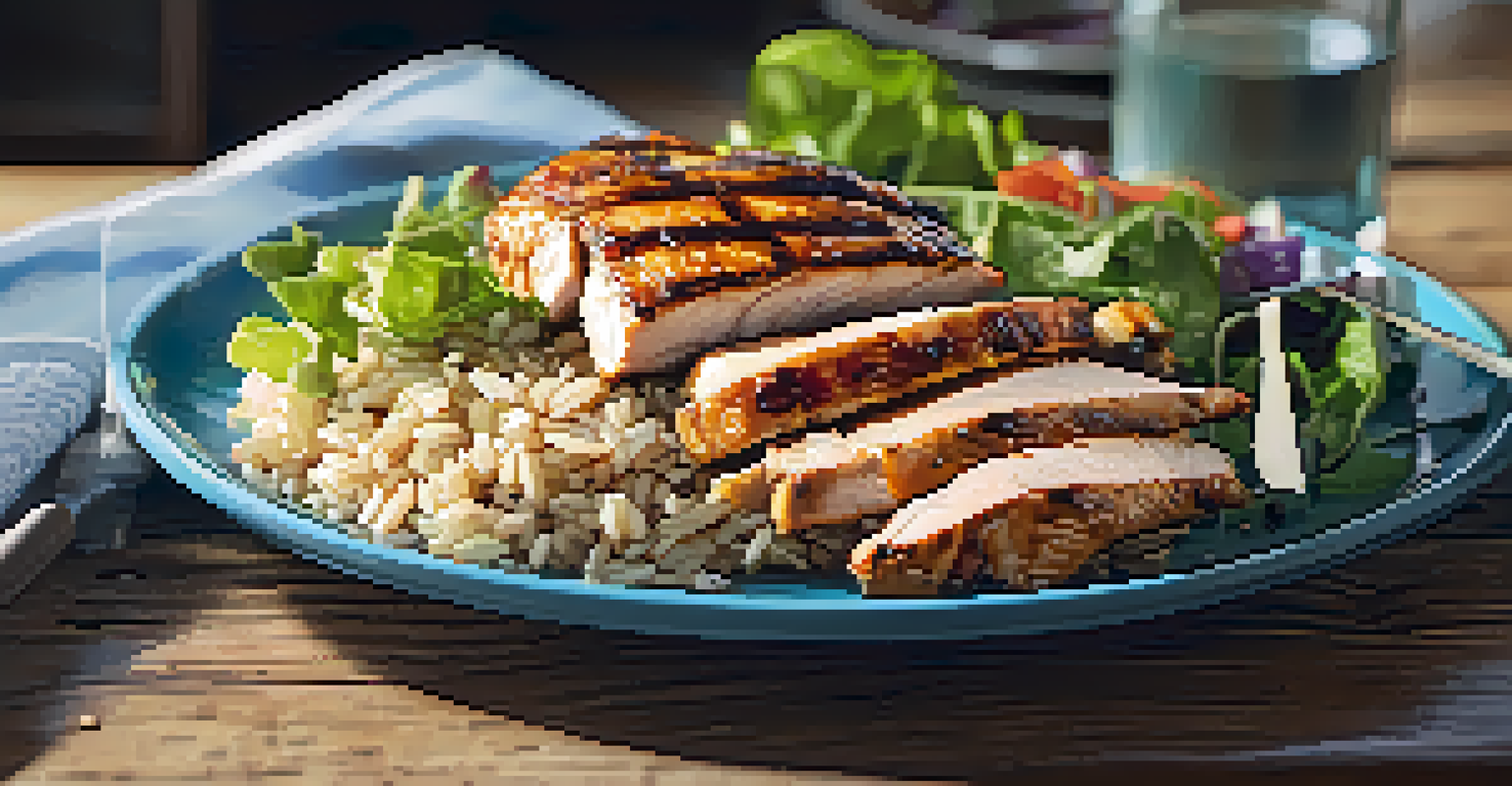Essential Nutritional Guidelines for Bodybuilders' Success

Understanding Macronutrients: The Building Blocks
Macronutrients, which include proteins, carbohydrates, and fats, are essential for any bodybuilder. Each plays a unique role in muscle growth, energy provision, and overall health. For instance, proteins are crucial for repairing and building muscle tissue post-workout.
Let food be thy medicine and medicine be thy food.
Carbohydrates serve as the primary energy source, fueling your workouts and recovery. If you think of your body like a car, carbs are the gasoline that keeps it running efficiently. Meanwhile, healthy fats support hormone production and joint health, ensuring you’re not just strong but also resilient.
Balancing these macronutrients is key; a common guideline is to focus on a higher protein intake, moderate carbohydrates, and healthy fats. This way, you'll not only support muscle gains but also maintain optimal energy levels for intense training sessions.
The Importance of Micronutrients in Muscle Development
While macronutrients get the spotlight, micronutrients—vitamins and minerals—are equally vital for bodybuilders. They play roles in everything from energy production to muscle contraction. For instance, magnesium helps with muscle function, while vitamin D is essential for calcium absorption and bone health.

It’s easy to overlook these tiny nutrients when you’re focused on protein shakes and meal prep. However, a deficiency in key vitamins can lead to fatigue and hinder your performance. Incorporating a variety of fruits and vegetables into your diet can help ensure you’re getting the necessary micronutrients.
Nutrition: Key to Muscle Growth
Balancing macronutrients like proteins, carbohydrates, and fats is essential for muscle growth and energy during workouts.
Consider adding a multivitamin or consulting a nutritionist to tailor your intake based on your specific needs and goals. This way, you can be confident that you’re covering all bases for muscle development and overall health.
Hydration: The Unsung Hero of Bodybuilding Nutrition
Hydration might not be the first thing that comes to mind when thinking about nutrition, but it’s crucial for bodybuilders. Water supports every physiological process, including muscle recovery and nutrient transport. Just as a plant needs water to thrive, your muscles need hydration to perform at their best.
The body achieves what the mind believes.
Dehydration can lead to fatigue, decreased strength, and impaired recovery. It’s recommended to drink water consistently throughout the day, not just during workouts. Aiming for at least half your body weight in ounces of water daily is a good rule of thumb.
In addition to plain water, consider incorporating electrolyte-rich drinks, especially after intense sessions. This will help replenish lost minerals and keep your body functioning optimally, ensuring you’re ready for your next workout.
Meal Timing: Optimizing Your Nutritional Window
Meal timing can play a significant role in muscle growth and recovery. Consuming nutrients at strategic times, such as before and after workouts, can enhance performance. For example, a pre-workout meal rich in carbs and protein can provide the energy needed for intense lifting.
Post-workout nutrition is equally important; consuming protein and carbohydrates within 30 to 60 minutes after exercising can help kickstart recovery. Think of it as refueling your body after a long trip—your muscles need that fuel to repair and grow.
Micronutrients Matter Too
Vitamins and minerals play a crucial role in energy production and muscle function, making a diverse diet important for bodybuilders.
Experimenting with your meal timing can help you find what works best for your body. Some bodybuilders prefer smaller meals throughout the day, while others thrive on three larger meals—find the rhythm that supports your energy levels and muscle gains.
Quality Over Quantity: Choosing Nutrient-Dense Foods
When it comes to bodybuilding nutrition, the quality of your food matters just as much as quantity. Prioritizing whole, nutrient-dense foods over processed options can significantly impact your performance and recovery. Think lean meats, whole grains, and plenty of fruits and vegetables.
Processed foods may be convenient, but they often lack the essential nutrients your body craves. For instance, a grilled chicken breast provides not just protein but also important vitamins and minerals, whereas a processed snack might offer empty calories without nutritional benefits.
Making conscious choices about your food can make a huge difference. Meal prepping with whole foods can help you stay on track with your nutrition goals, ensuring you fuel your body with the best possible ingredients.
Supplement Wisely: When and What to Use
Supplements can be a helpful addition to a bodybuilder's diet, but they should never replace whole foods. Protein powders, for example, can be convenient for meeting protein needs, especially post-workout. However, it’s essential to choose high-quality supplements that are free from unnecessary additives.
Other popular supplements for bodybuilders include creatine, BCAAs (branched-chain amino acids), and omega-3 fatty acids. Each serves a specific purpose, such as enhancing recovery or reducing inflammation. But remember, supplements work best in conjunction with a solid diet.
Hydration Supports Performance
Staying hydrated is vital for muscle recovery and overall performance, as water aids in nutrient transport and physical processes.
Before introducing new supplements, consider consulting with a healthcare professional or dietitian. They can help you determine what’s right for your goals and ensure you’re not exceeding safe levels of any nutrient.
Listening to Your Body: Adapting Nutrition to Your Needs
As you embark on your bodybuilding journey, it’s essential to listen to your body and adapt your nutrition accordingly. Everyone’s body responds differently to training and diet, so what works for one person may not work for you. Pay attention to how you feel during workouts and recovery.
If you find yourself feeling fatigued or not recovering well, it might be time to reassess your nutritional intake. Adjusting your macro ratios or meal timing can make a significant difference in your performance and results. It’s all about finding the right balance for your unique body.

Don't be afraid to experiment and make changes as needed. Keeping a food diary can help you track what works best for you, leading to better gains and overall health as you progress in your bodybuilding journey.